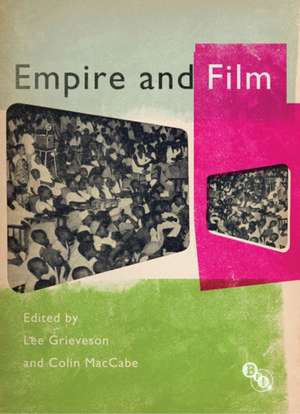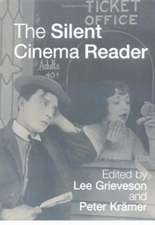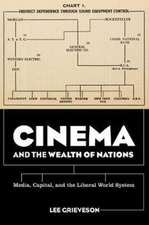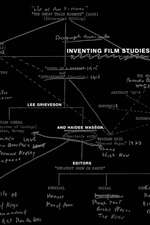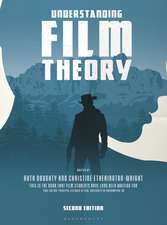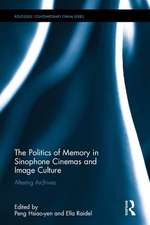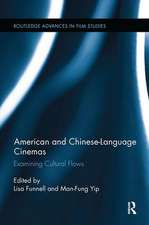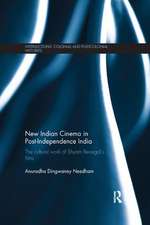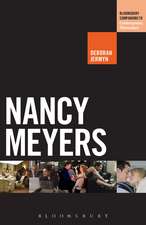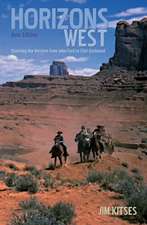Empire and Film: Cultural Histories of Cinema
Autor Lee Grievesonen Limba Engleză Paperback – 18 oct 2011
BRIAN LARKIN, Barnard College
'This superb collection of new scholarship shows how cinema both communicated and aided the imperialist agenda throughout the twentieth century. In doing so, it shows film can be understood as one of the tools of empire, as much as the technology of weaponry or modes of administration: a means of education and indoctrination in the colonies and at home.'
TOM GUNNING, University of Chicago
At its height in 1919, the British Empire claimed 58 countries, 400 million subjects, and 14 million square miles of ground.Empire and Filmbrings together leading international scholars to examine the integral role cinema played in the control, organisation, and governance of this diverse geopolitical space. The essays reveal the complex interplay between the political and economic control essential to imperialism and the emergence and development of cinema in the late nineteenth and first half of the twentieth century.
Contributors address how the production, distribution and exhibition of film were utilised by state and industrial and philanthropic institutions to shape the subject positions of coloniser and colonised; to demarcate between 'civilised' and 'primitive' and codify difference; and to foster a political economy of imperialism that was predicated on distinctions between core and periphery. The generic forms of colonial cinema were, consequently, varied: travelogues mapped colonial spaces; actuality films re-presented spectacles of royal authority and imperial conquest and conflict; home movies rendered colonial self-representation; state-financed newsreels and documentaries fostered political and economic control and the 'education' of British and colonial subjects; philanthropic and industrial organisations sponsored films to expand Western models of capitalism; British and American film companies made films of imperial adventure. These films circulated widely in Britain and the empire, and were sustained through the establishment of imperial networks of distribution and exhibition, including in particular innovative mobile exhibition circuits and non-theatrical spaces like schools, museums and civic centres.Empire and Filmis a significant revision to the historical and conceptual frameworks of British cinema history, and is a major contribution to the history of cinema as a global form that emerged amid, and in dialogue with, the global flows of imperialism.
The book is produced in conjunction with a major website housing freely available digitised archival films and materials relating to British colonial cinema, www.colonialfilm.org.uk, and a companion volume entitledFilm and the End of Empire.
| Toate formatele și edițiile | Preț | Express |
|---|---|---|
| Paperback (1) | 235.75 lei 3-5 săpt. | |
| British Film Institute – 18 oct 2011 | 235.75 lei 3-5 săpt. | |
| Hardback (1) | 601.69 lei 3-5 săpt. | |
| British Film Institute – 18 oct 2011 | 601.69 lei 3-5 săpt. |
Preț: 235.75 lei
Nou
Puncte Express: 354
Preț estimativ în valută:
45.11€ • 47.10$ • 37.25£
45.11€ • 47.10$ • 37.25£
Carte disponibilă
Livrare economică 25 martie-08 aprilie
Preluare comenzi: 021 569.72.76
Specificații
ISBN-13: 9781844574216
ISBN-10: 1844574210
Pagini: 292
Ilustrații: 20 b/w photos
Dimensiuni: 155 x 235 x 20 mm
Greutate: 0.59 kg
Ediția:2011
Editura: British Film Institute
Colecția British Film Institute
Seria Cultural Histories of Cinema
Locul publicării:London, United Kingdom
ISBN-10: 1844574210
Pagini: 292
Ilustrații: 20 b/w photos
Dimensiuni: 155 x 235 x 20 mm
Greutate: 0.59 kg
Ediția:2011
Editura: British Film Institute
Colecția British Film Institute
Seria Cultural Histories of Cinema
Locul publicării:London, United Kingdom
Cuprins
Introduction:
'To
take
ship
to
India
to
see
a
naked
man
spearing
fish
in
blue
water':
Watching
Films
to
Mourn
the
End
of
Empire;C.MacCabe.-
PART
I:
EARLY
CINEMATIC
ENCOUNTERS
WITH
EMPIRE.-
'The
Captains
and
the
Kings
Depart':
Imperial
Departure
and
Arrival
in
Early
Cinema;I.Christie.-'Sons
of
our
Empire':
Shifting
Ideas
of
'Race'
and
the
Cinematic
Representation
of
Imperial
Troops
in
the
First
World
War;T.HaggithandR.Smith.-American
Philanthropy
and
Colonial
Filmmaking
–
the
Rockefeller
Foundation,
the
Carnegie
Corporation,
and
the
Birth
of
Colonial
Cinema;J.Burns.-
PART
II:
THE
STATE
AND
THE
ORIGINS
OF
DOCUMENTARY.-
The
Cinema
and
the
(Common)Wealth
of
Nations;L.Grieveson.-Exhibiting
Africa:
British
Instructional
Films
and
The
Empire
Series
(1925-1928);T.Rice.-Imperialism
and
Internationalism:
The
British
Documentary
Movement
and
the
Legacy
of
the
Empire
Marketing
Board;S.Anthony.-PART
III:
COLONIALISM
AND
THE
REPRESENTATION
OF
SPACE.-
Representing
Connection:
A
Multimedia
Approach
to
Colonial
Film,
1918-1939;D.Trotter.-An
'Accurate
Imagination':
Place,
Map
and
Archive
as
Spatial
Objects
of
Film
History;P.Jaikumar.-Domesticating
Empire
in
the
1930s:
Metropole,
Colony,
Family;J.Codell.-PART
IV:
AFRICAN
EXPERIMENTS.-
The
Bantu
Educational
Kinema
Experiment
and
the
Political
Economy
of
Community
Development;A.Windel.-Colonialism,
Visuality
and
the
Cinema:
Revisiting
the
Bantu
Educational
Kinema
Experiment;A.Sanago.-'Of
Great
Use
at
Meetings:
Film-Making
Principles
of
the
London
Missionary
Society';F.Gooding.-Paul
Robeson
and
the
Cinema
of
Empire;C.Musser.
Notă biografică
LEE
GRIEVESON is
Director
of
Film
Studies
at
University
College
London.
COLIN MACCABE is Distinguished Professor of English and Film at the University of Pittsburgh and Associate Director of the London Consortium.
COLIN MACCABE is Distinguished Professor of English and Film at the University of Pittsburgh and Associate Director of the London Consortium.
Textul de pe ultima copertă
'This
important
new
volume
reconstructs
the
forms
of
production,
distribution
and
exhibition
of
films
made
in
and
about
the
colonies.
It
then
ties
them
to
wider
theoretical
issues
about
film
and
liberalism,
spectacle
and
political
economy,
representation
and
rule.
The
result
is
one
of
the
first
volumes
to
examine
how
imperial
rule
is
intimately
tied
to
the
emergence
of
documentary
as
a
form
and,
indeed,
how
the
history
of
cinema
is
at
the
same
time
the
history
of
Empire.'
BRIAN LARKIN, Barnard College
'This superb collection of new scholarship shows how cinema both communicated and aided the imperialist agenda throughout the twentieth century. In doing so, it shows film can be understood as one of the tools of empire, as much as the technology of weaponry or modes of administration: a means of education and indoctrination in the colonies and at home.'
TOM GUNNING, University of Chicago
At its height in 1919, the British Empire claimed 58 countries, 400 million subjects, and 14 million square miles of ground.Empire and Filmbrings together leading international scholars to examine the integral role cinema played in the control, organisation, and governance of this diverse geopolitical space. The essays reveal the complex interplay between the political and economic control essential to imperialism and the emergence and development of cinema in the late nineteenth and first half of the twentieth century.
Contributors address how the production, distribution and exhibition of film were utilised by state and industrial and philanthropic institutions to shape the subject positions of coloniser and colonised; to demarcate between 'civilised' and 'primitive' and codify difference; and to foster a political economy of imperialism that was predicated on distinctions between core and periphery. The generic forms of colonial cinema were, consequently, varied: travelogues mapped colonial spaces; actuality films re-presented spectacles of royal authority and imperial conquest and conflict; home movies rendered colonial self-representation; state-financed newsreels and documentaries fostered political and economic control and the 'education' of British and colonial subjects; philanthropic and industrial organisations sponsored films to expand Western models of capitalism; British and American film companies made films of imperial adventure. These films circulated widely in Britain and the empire, and were sustained through the establishment of imperial networks of distribution and exhibition, including in particular innovative mobile exhibition circuits and non-theatrical spaces like schools, museums and civic centres.Empire and Filmis a significant revision to the historical and conceptual frameworks of British cinema history, and is a major contribution to the history of cinema as a global form that emerged amid, and in dialogue with, the global flows of imperialism.
The book is produced in conjunction with a major website housing freely available digitised archival films and materials relating to British colonial cinema, www.colonialfilm.org.uk, and a companion volume entitledFilm and the End of Empire.
BRIAN LARKIN, Barnard College
'This superb collection of new scholarship shows how cinema both communicated and aided the imperialist agenda throughout the twentieth century. In doing so, it shows film can be understood as one of the tools of empire, as much as the technology of weaponry or modes of administration: a means of education and indoctrination in the colonies and at home.'
TOM GUNNING, University of Chicago
At its height in 1919, the British Empire claimed 58 countries, 400 million subjects, and 14 million square miles of ground.Empire and Filmbrings together leading international scholars to examine the integral role cinema played in the control, organisation, and governance of this diverse geopolitical space. The essays reveal the complex interplay between the political and economic control essential to imperialism and the emergence and development of cinema in the late nineteenth and first half of the twentieth century.
Contributors address how the production, distribution and exhibition of film were utilised by state and industrial and philanthropic institutions to shape the subject positions of coloniser and colonised; to demarcate between 'civilised' and 'primitive' and codify difference; and to foster a political economy of imperialism that was predicated on distinctions between core and periphery. The generic forms of colonial cinema were, consequently, varied: travelogues mapped colonial spaces; actuality films re-presented spectacles of royal authority and imperial conquest and conflict; home movies rendered colonial self-representation; state-financed newsreels and documentaries fostered political and economic control and the 'education' of British and colonial subjects; philanthropic and industrial organisations sponsored films to expand Western models of capitalism; British and American film companies made films of imperial adventure. These films circulated widely in Britain and the empire, and were sustained through the establishment of imperial networks of distribution and exhibition, including in particular innovative mobile exhibition circuits and non-theatrical spaces like schools, museums and civic centres.Empire and Filmis a significant revision to the historical and conceptual frameworks of British cinema history, and is a major contribution to the history of cinema as a global form that emerged amid, and in dialogue with, the global flows of imperialism.
The book is produced in conjunction with a major website housing freely available digitised archival films and materials relating to British colonial cinema, www.colonialfilm.org.uk, and a companion volume entitledFilm and the End of Empire.
Caracteristici
High
profile
publication
linked
to
major
BFI
project
on
colonial
cinema
Will be published to tie in with conference at Tate Britain
Leading international scholars among the contributors
Will be richly illustrated with images from the BFI National Archive
Brings together worldrenowned scholars from around the world to address, for the first time, the intricate connections between cinema and colonialism in the early twentieth century
Will be published to tie in with conference at Tate Britain
Leading international scholars among the contributors
Will be richly illustrated with images from the BFI National Archive
Brings together worldrenowned scholars from around the world to address, for the first time, the intricate connections between cinema and colonialism in the early twentieth century
